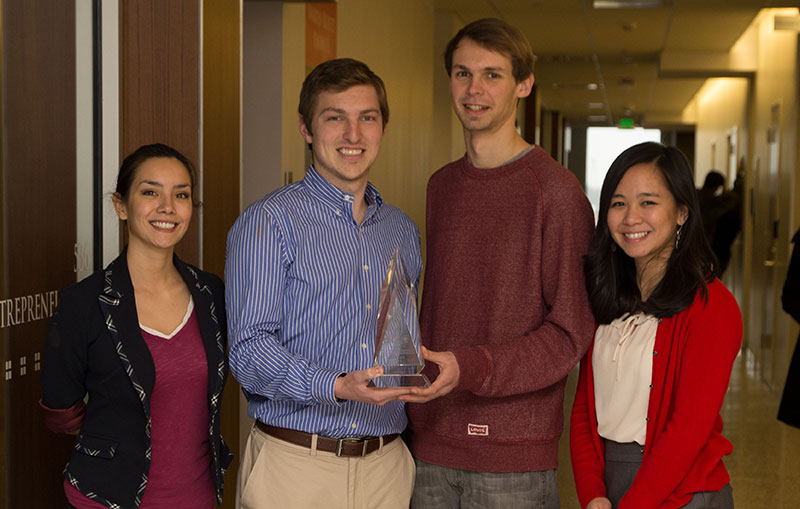Bauer Entrepreneurship Students Win Grand Prize at Biz Plan Competition
Team from Wolff Center for Entrepreneurship Pitches REEcycle, Wins Grand Prize at Baylor New Venture Competition
Published on March 4, 2014

Bauer students (from left) Cassandra Hoang, Casey McNeil, Bobby Jacobs and Susan Tran from the college’s Wolff Center for Entrepreneurship won grand prize at the Baylor New Venture Competition.
EDITOR’S NOTE: This is the first in a series of stories highlighting the success of student business plan teams from the Bauer College’s Wolff Center for Entrepreneurship in Spring 2014. Each year, WCE students work with the university’s Division of Research to develop commercialization plans for technologies developed at the university. Over the past 12 years, Bauer teams have had 21 podium finishes in national business plan competitions.
Four undergraduate students from the C. T. Bauer College of Business at the University of Houston bested teams from across the U.S. that included MBA and Ph.D. participants to take the grand prize at the Baylor New Venture Competition in March.
The team, all students in the college’s Wolff Center for Entrepreneurship, included Cassandra Hoang, Bobby Jacobs, Casey McNeil and Susan Tran. Their business plan focused on a technology developed by Allan Jacobson, the Robert A. Welch Chair of Science and Director of the Texas Center for Superconductivity at UH, that addresses rare earth elements (REE) used in computer memory, rechargeable batteries, cell phones, catalytic converters, fluorescent lighting and more.
The REEcycle plan, as it is known, is part of a program adopted this year to have Bauer students create business plans around technologies provided by the university’s Division of Research.
“We need science, technology, engineering and math, or STEM, to generate innovative ideas, and we also need creative ways to wrap a business around it,” Dean Latha Ramchand said. “We really need STEMB — science, technology, engineering, math and business.”
REEcycle focuses on recycling rare earth elements, Neodymium and Dysprosium, using a revolutionary process created by Dr. Jacobson to extract these elements from disposed electronic waste, creating a sustainable domestic supply of these critical elements.
“We worked with Dr. Jacobson from the chemistry department to utilize the amazing technology he has worked so hard to develop,” McNeil added. “We also truly believed in the technology which helped to build the tremendous passion our team has for our company.”
The demand for these elements is outpacing supply with the U.S. reliant on China to produce Neodymium and Dysprosium, which power our phones, electric cars and wind turbines.
“REEcycle reclaims critical rare earth elements from discarded hard drive magnets,” Tran said. “China controls over 97% of the world’s supply. Our business solves a national issue of rare earth element supply shortage.”
The competition consisted of a two-day event where the students participated in a feedback round allowing them to tweak their pitch for the semi-final and final competition the next day. Using the skills learned at the Bauer College, Jacobs knew they were poised for success.
“Bauer gave us the tools to get to where we are today,” Jacobs said. “From the amazing mentors to the knowledge from the finance, accounting and entrepreneurship classes, we would not have won if it wasn’t for all the resources provided by Bauer.”
In the past 12 years, Bauer students from the Wolff Center have had 21 podium finishes in national business plan competitions.
“Our students knew the stakes were not even,” Ramchand said. “These were undergraduates competing against graduate students, not to mention students from Harvard, Yale and MIT. Did that matter? Of course not. Did they win? You bet. First place? But of course.”